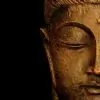Krishna's revolt against the caste system
Krishna was born in the race of Yadu, the son of Aila king Yayati and Devayani (daughter of the Asura priest Sukra). Devayani was a Brahmana while Yayati was a Kshatriya.
The son of a Kshatriya upon a Brahmana woman was considered as a Suta whose occupation was to ride chariots of kings and to become assistants of kings.
Though during the time of Yayati, caste was very flexible and not well defined, during the later stages it started becoming rigid. The race of the Yadus was not given the same status as of the race of the Purus (Yayati's younger son) even in the days of Yayati.
Instead of calling Yadus to be Sutas, it was proclaimed that the Yadu-clan is cursed. The reason for the curse was explained away as a fable. (Yayati cursed his son Yadu when Yayati asked Yadu to take his old-age and Yadu refused).
Puru was the son of Kshatriya Yayati and his Kshatriya wife Sarmistha (the daughter of king Vrishaparva of Asura race). Puru and his race was not cursed since Puru's birth follows the dictates of the caste-system. (But the fable won't say this but give a different explanation: Puru agreed to what Yadu refused and so he was awarded the throne and his race was blessed). The Bharatas and the Kurus descended from the race of Puru and had the same contempt for the Yadus or the Yadavas.
Thus Krishna was not considered a high-born by birth, especially by the conservative sections of the Kurus and their Brahmana priests, since he belonged to the Yadu's race.
Yet he became a great statesman, war-strategist and philosopher of his age. He was a younger contemporary to yet another statesman Vidura who was the minister of Kuru king Dhritarashtra.
Krishna played more or less similar role to the Yadava kingUgrasena that Vidura did as a minister to Kuru king Dhritarashtra. Vidura was believed to be the son of aSudra women and was a low born like Krishna.
He was also contemporary to Karna who lived as a Suta. Karna was actually born to Kunti the mother of the Pandavas, thus an elder brother of the five Pandavas. But since he was adopted by Suta Adhiratha and his wife Radha, he was known to the world as a Suta, thus considered to be low-born.
Krishna had to suffer humiliation at the hands of many like Jarasandha, Sishupala and especially Duryodhana due to his low birth, while the Pandavas and Vyasa acknowledged his greatness.
Vyasa, the author of Mahabharata himself was born of a Sudra woman Satyavati, who later became the queen of Kuru king Santanu. Similarly Karna too had to suffer humiliation by others like Bhima and Kripa due to his caste. Vidura too because of his low birth could not get sovereignty of the kingdom in spite of his unparalleled wisdom.
Vyasa was not accepted by many of his contemporaries, which is evident from many passages in Mahabharata that tries to defame him. Out of all these men, Krishna was of a spirited soul and his charismatic nature won a lot of admiration from everybody with whom he interacted, even from hard hearted men like Duryodhana. Mahabharata also has several passages where Krishna is mentioned as having affectionate interactions with Vidura, Karna and Vyasa, as all of them shared the burden of low-born status. Though the Pandavas had glorified fables about their births, they too was considered by many to have a questionable birth. This was even so for Panchali, the queen of the Pandavas. Thus they too shared a common bond with Krishna.
Many hostile men like Duryodhana considered him to be of the status of a Suta.
Knowing that many among the Kurus consider the members of the Yadu clan to be Sutas, Krishna intentionally chose to become a chariot-driver of Arjuna which is the job of a Suta.
But Krishna turned it to a joyful exercise and mocked the caste system that was strengthening its tentacles into the Indian society. He converted it into a philosophical symbolism where the intellect (Krishna) guides the soul (Arjuna), in a chariot (the body), driven by the senses (the horses).
He also proclaimed in his Gita sermon that the four orders of caste are based on once nature (guna) and acts (karma). Thus he denies caste which is based on ones birth. He also consider himself to be the creator of this new definition of caste (chatur-varnya) and the destroyer of the old definition based on birth.

































